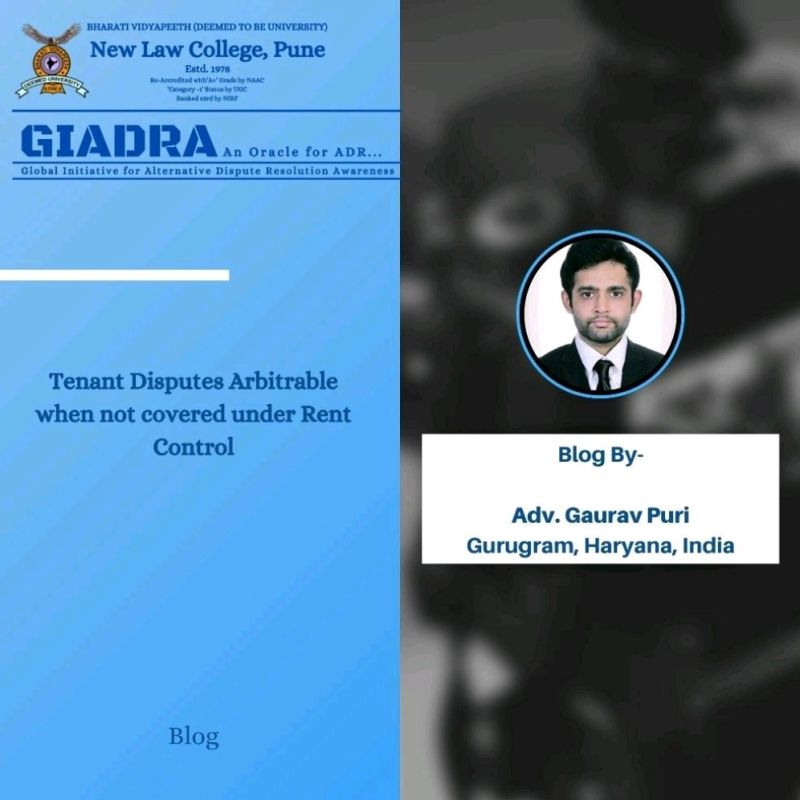Introduction:
Over the years, the Indian Legal Jurisprudence on Arbitration has been evolving and strengthening to resolve matters voluntarily chosen by parties to be determined by Arbitral Tribunals. The landmark decision taken by the Hon’ble Supreme Court in Vidya Drolia v. Durga Trading Corporation, [2020 SCC OnLine SC 1018, decided on 14.12.2020] declaring Landlord-Tenant disputes as arbitral when not covered under special statutes or governed by various rent control legislations is another positive step in the direction in encouraging Arbitration to resolve disputes.
The Hon’ble Supreme Court in Vidya Drolia (supra) adjudicated the correctness of the ratio expressed in Himangni Enterprises v. Kamaljeet Singh Ahluwalia [(2017) 10 SCC 706] wherein an application under Section 8 of the Arbitration Act in a civil suit for eviction, arrears of rent and permanent injunction was rejected. The said tenancy was not protected under the rent control legislations and it was held that the landlord-tenant disputes governed by the provisions of the Transfer of Property Act, 1882, are not arbitrable based on the public policy doctrine.
The Hon’ble Supreme Court in Vidya Drolia (supra) adjudicated upon the (a) meaning of non-arbitrability and when the subject matter of the dispute is not capable of being resolved through arbitration; and (b) who decides arbitrability. For the purposes of this blog we would discuss the first issue as determined by the Apex Court vis-à-vis landlord-tenant disputes.
Existing Jurisprudence (Background)
The Apex Court whilst overruling the dictum in Himangi Enterprises (supra) observed that the issue of non-arbitrability has been examined previously in Natraj Studios (P) Ltd. v. Navrang Studios [(1981) 1 SCC 523] and Booz Allen & Hamilton Inc. v. SBI Home Finance Ltd. [(2011) 5 SCC 532]. In both the above matters it has been clearly held that eviction or tenancy matters governed by special statues and before the designated Courts that have been conferred jurisdiction under the said statute as they are specifically excluded from Arbitration whilst also being a right in rem.
Natraj Studios (P) Ltd. & Booze Allen & Hamilton (supra) set out the position of law that has been subsequently adopted in Vidya Drolia (supra). Whereas in Natraj Studios (P) Ltd. it was held that wherein tenancy is protected under Rent control act designating a specific Court alone to adjudicate disputes the remedy of Arbitration would not lie. In addition to the said principle in Booze Allen & Hamilton it was held that a right in rem is a right exercisable against the world at large whereas a right in personam protects solely against specific individuals. Therefore, all disputes relating to rights in personam are considered to be amenable to arbitration; and all disputes relating to rights in rem are required to be adjudicated by courts and public tribunals, being unsuited for private arbitration.
However, the caveat being that the exclusion of certain matters from Arbitration by the Legislature must be based on public policy and as such when public policy mandates that a case is not arbitrable in nature then thereafter the Courts would not be allowed to entertain either a Section 8 or even a Section 11 application under the Arbitration Act irrespective of the fact that the parties have chosen arbitration as the dispute resolution mechanism. The whole legislative intent of specifically designating Courts to adjudicate matters under the various Rent Control Legislations is the harassment caused to the tenants by the landlords and as such the parties cannot go against the social and legislative mandate of such protective legislation which is a matter of public policy. However, Himangni Enterprises (supra) deviated from the above-mentioned settled law barring the remedy of Arbitration in cases of tenancies governed under the Transfer of Property Act, therefore the said ratio was overruled by the Court by a reference to a Three-Judge Bench in Vidya Drolia (supra).
Dictum
The Hon’ble Supreme Court post the analysis of the above-mentioned cases with regards to the Arbitrability of disputes governed under the Transfer of Property Act held that
“48. Landlord-tenant disputes governed by the Transfer of Property Act are arbitrable as they are not actions in rem but pertain to subordinate rights in personam that arise from rights in rem. Such actions normally would not affect third-party rights or have erga omnes affect or require centralized adjudication.” … “49. However, landlord-tenant disputes covered and governed by rent control legislation would not be arbitrable when specific court or forum has been given exclusive jurisdiction to apply and decide special rights and obligations. Such rights and obligations can only be adjudicated and enforced by the specified court/forum, and not through arbitration.”
Conclusion
The decision of the Hon’ble Supreme Court in Vidya Drolia (supra) has adopted a pro-arbitration stance has put a rest to the debate of how and when are landlord-tenancy disputes arbitrable by clearly setting out the principles of arbitrability. The decision of Court will go a long way in helping the burden of pending litigation, especially with rise of landlord-tenant disputes on account of the onset of Covid-19 and the subsequent rise in tenancy disputes.
